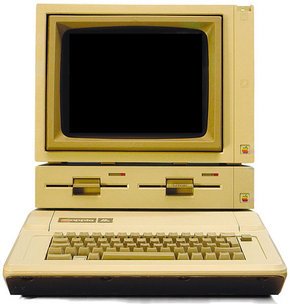Time - It's Not Just For Fun Anymore: The Technology Edition
The Cellular Phone: A Brief History
The concept for cellular phone technology actually originated in the late 1940’s when it occurred to someone that you could break up radio-frequency into grids – or cells – and greatly improve telephone technology, but the cellular phone, in it’s current incarnation, didn’t appear on the market until 1984 – and when it did, it landed with a great big splash – literally.
Upsides of the DynaTAC 8000X – if you were ever caught in a dark alley, your phone doubled quite effectively as a bludgeoning device.
The mp3 Player: A Broad OutlookWe all know what a new phenomenon the iPod is – overwhelming the world with it’s completely ineffective technology and, yet, it’s attachment to iTunes and proprietary format have entrapped buyers, like me, who simply cannot go without a personal mp3 player.
Born in the mid-80’s on the cusp of the CD revolution, I saw a touch of tape players and lived through years of scratched CD’s. With a brief forey not so long ago into the realm of the MINIdisc – a technology only recently reincarnated for the Sony PSP – my life moved seamlessly from CD to true digital media – the mp3 player.
The most important thing to remember when considering an mp3 player’s role in your fanfiction is that mp3 players didn’t come to be until 1997 when SaeHan Information Systems had a brilliant idea. What that means, ladies and gents, is that even if Draco is far more tech savvy than one can truly believe he is, he still couldn’t have gotten his hands on the device until the dreaded HBP.
Since the days of the humble 32MB portable device, mp3 players have grown to include massive 40G Archos players and tiny iPod Nano’s but you just can’t blur the dates.
 Computers for home use have not always been as prolific as they are today and, even today, it is sometimes hard to remember that most
Computers for home use have not always been as prolific as they are today and, even today, it is sometimes hard to remember that most
The PC that most adult geeks are quickest to remember, in truth, is the Apple IIe – the behemoth we’ve all come to know and love, released in 1983. How retro is that?
The point is this – part of writing, particularly fantasy, is to take yourself out of where you are, and so much of where we are is technology. If not because canon insists on it or because history demands it, at least leave this sort of thing out of your story for the sake of your self-respect.
The closest the Marauders would have ever gotten to an X-Box would have been the original Atari console - which released in 1971 and still kicks unequivocal ass. My somewhat geekier friends tell me that the Atari 2600 is all that counts :) The next system anyone could have gotten their dirty mitts on would have been the advent of Nintendo. Proof that 1985 was a good year for geeks, girl and gaming varieties, Nintendo released the NES - a console that is still played in more mom's basements than you or I care to deal with. Other 80's contenders included the SEGA and the SNES (Super Nintendo Entertainment System.) From what I can tell, and my gamer knowledge is a little fuzzy, the Sony Playstation hit European markets in 1996.
Since then, consoles have evolved a lot from the PlayStation 2 in 2000, the original X-BOX in 2001, to the X-box 360 release mayhem just last year.
Tech Tid-Bits
- Floppy disks used to actually be floppy - like a piece of bologna.
- One of the largest innovations in the Apple IIE from the Apple II was the advent of a system that supported both capital and lowercase letters.
- The original cellular phone was not worth it's weight in gold.
- The internet has not always existed but, yes, Al Gore did have a hand in it's creation.
- Instant messaging was born, for engineers and academics, in the 1980's, but the first general messaging system was ICQ and didn't premiere until 1996.
- Lily cannot call her friend Britney up on her RAZR and ask her to come to Gladrag's Wizard Wear
- Harry - owner of no muggle money - would, likely, be unable to hang out with Ron and Hermione and show them the tunes he downloaded over the summer with his new fangled mp3 player.
- James didn't send Lily anonymous e-mails declaring his love for her.
- I remember Prodigy. Lily Evans doesn't. She did, however, probably play PONG
